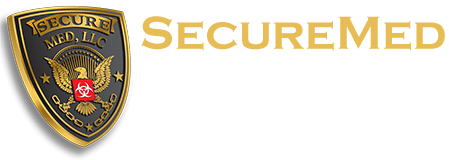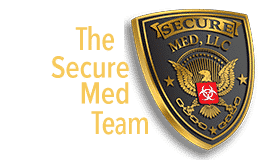How to Handle the Hazards of Regulated Medical Waste Disposal
According to the Healthcare Environmental Resource Center, Regulated Medical Waste is defined as the portion of the waste stream that may be contaminated by blood, body fluids or other potentially infectious materials, thus posing a significant risk of transmitting infection. Medical waste goes by several names that all have the same basic definition. All of the terms listed below refer to waste created during the healthcare process that’s either contaminated or potentially contaminated by infectious material:
- Medical Waste
- Biomedical Waste
- Clinical Waste
- Biohazardous Waste
- Infectious Medical Waste
- Healthcare waste
The terms are used interchangeably, but there’s a distinction between general healthcare waste and hazardous medical waste. The World Health Organization (WHO) categorizes sharps, human tissue, fluids, and contaminated supplies as “biohazardous,” and non-contaminated equipment and animal tissue as “general medical waste.” Handling hazardous waste is a big deal, and the ‘how’ is more important than the ‘what’. If you own, work in, inspect or clean a facility that deals with Regulated Medical Waste (RMW), then you already know what you’re dealing with, but you may not know how to handle it in the best way possible, or what requirements or laws you need to follow.
Types of Treatment
No matter where RMW is processed, it’s ultimately treated by incineration, autoclaving, microwaving, chemically or biologically.
Incineration: Before 1997, over 90% of all RMW was disposed of via incineration. Changes to EPA regulations have caused providers to seek other disposal options, but incineration is still the only method used on pathological waste (i.e. body parts and recognizable tissue).
Autoclaving: Steam sterilization actually causes RMW to be non-infectious. After it’s been sterilized, the waste can be disposed of in solid waste landfills, or it can be incinerated under less severe regulations.
Microwaving: Another way to make RMW non-hazardous is to microwave it with high-powered equipment. Similar to autoclaving, this treatment allows the waste to be disposed of in normal landfills or incineration.
Chemical: Some kinds of RMW can be treated by applying reactive chemicals to it, but this is generally reserved for waste that is already chemical in nature.
Biological: This experimental method of treating RMW uses enzymes to neutralize hazardous, infectious organisms. Currently, this method is still under development and is rarely used.
Types of Disposal
As far as how treatment is handled when disposing RMW, here are the main options your facility has for disposal:
On-Site Treatment
The on-site treatment of RMW is typically limited to large, well-funded hospitals and facilities. On-site treatment is extremely costly because the required equipment is expensive to buy, expensive to maintain, and expensive to manage and run. There is also the issue of regulations and law around such equipment (and its use) – this keeps the number of companies who can perform this type of treatment much smaller than those handling other forms of disposal.
Off-Site Treatment
Off-site RMW treatment is a far more cost-effective option for most small and mid-sized medical practices and facilities. Third-party disposal companies, whose main business is RMW collection and disposal, have the equipment and training needed to handle the process. Vendors can collect the waste either by truck or by mail.
- Truck services require a contract with a specially licensed disposal company to haul the waste away for regular destruction. The waste is hauled in special containers to a dedicated disposal facility.
- Mail or box services use the U.S. Postal Service to ship the waste safely to a facility for treatment. This is generally the most cost effective of all the methods. It requires a company that is fully compliant and experienced in all special Postal Service regulations and best practices.
So…what are my options?
I know what you’re thinking – if, after considering all of this information, you decide that off-site treatment is the most cost-efficient and safest option for Regulated Medical Waste disposal for your business, how do you go about finding a reputable vendor that is fully licensed, insured and compliant? You can (and should) ask any medical waste disposal company the right questions first, but one way to help you determine the direction you should go is by staying local. Choosing to partner with a larger, nationally-based destruction service may seem like the best option, but you may end up feeling like your facility is just a number, and you may miss out on receiving personalized customer service. Finding a local company you can trust, one that will consider the needs of your facility and tailor their services for those needs, will give you peace of mind, knowing that if a crisis comes, they can safely and speedily handle whatever is needed.
If you’re located in the Birmingham or Huntsville areas, contact us at Secure Med – we can assess your needs and provide the necessary services for handling your RMW. Don’t let the hazards of RMW disposal hinder your business – call us today!







